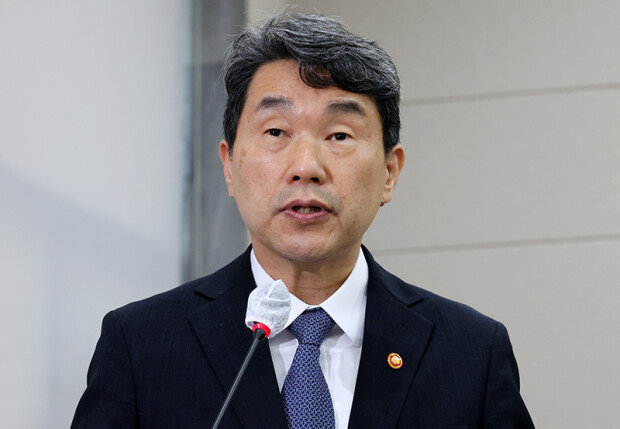Education minister: ‘If we hold out for six months, we’ll win’
Education minister: ‘If we hold out for six months, we’ll win’
Posted August. 31, 2024 15:15,
Updated August. 31, 2024 15:46

After President Yoon Suk Yeol reaffirmed the plan to increase medical school seats during a press conference on Thursday, concerns surfaced even among pro-Yoon lawmakers at a People Power Party dinner held later that day over the ongoing medical vacuum. When government officials reiterated the commitment to expanding medical schools, some lawmakers reportedly questioned the approach, asking, "Contrary to what you've reported, the medical field is struggling," and "Do you have a plan to bring back the protesting residents?" In response, Education Minister Lee Joo-ho stated, "If we hold out for six more months, we will win," but later apologized after facing criticism from lawmakers who asked, "Are you treating doctors as the enemy?"
The government's stance of treating the medical community as an opponent that must be fought and defeated is deeply problematic. However, even more concerning is their unfounded confidence in a supposed “victory.” The statement “we will win” likely implies that the government believes residents and medical students will eventually give in and return, allowing for the planned increase in medical school seats and the normalization of medical education. However, residents have consistently demanded the cancellation of the increase in medical school seats. Since the government rejected the ruling party leader’s proposal to delay the increase until the 2026 school year, residents' resolve has only hardened. The 32 medical schools slated for increased enrollment are already facing a situation where normal education would be impossible even if students were to return immediately. On what basis does the government believe it will achieve victory?
It is irresponsible for a government entrusted with the health of its people to prolong a medical vacuum that has already reached its limit simply to push forward with an increase in medical school admissions. When questioned about the emergency room chaos during Chuseok, President Yoon advised, “Go to the scene.” Yet, the reality is that the exodus of specialists following the departure of residents is causing severe disruptions in emergency medical care. The surgical vacuum is equally dire, with a 7.5% increase in deaths among patients awaiting transplant surgeries compared to last year. The situation feels unbearable for patients and their families—“We can’t even last a day, let alone six months.”
Meanwhile, on Friday, the Presidential Special Committee on Medical Reform announced its first implementation plan, which includes increasing the number of essential medical subjects and raising the ratio of severely ill patients treated at general hospitals. Additionally, an organization dedicated to estimating the required number of doctors will be established this year. Had this organization been created first and the number of medical school admissions adjusted accordingly, the opposition from doctors might have been avoided. Due to this disorganized approach, the debate over increasing medical school seats has overshadowed the broader medical reform, preventing the initiative from gaining any real momentum from the outset. The biggest losers in this legislative deadlock are the people themselves. The ruling and opposition parties must collaborate to resolve the situation swiftly. This is not the time for arrogant assertions such as, “If we can’t increase the number, we lose.”
Headline News
- N. Korea reveals HEU production facility for the first time
- Kimpo Airport suffers another Leak, just two weeks after repairs
- Court: First Lady’s brokerage accounts used for stock price manipulation
- Trump’s lies about immigrants eating dogs instigate bomb threat
- India’s first major leaguer Roker puts on ‘7K show’ in debut







